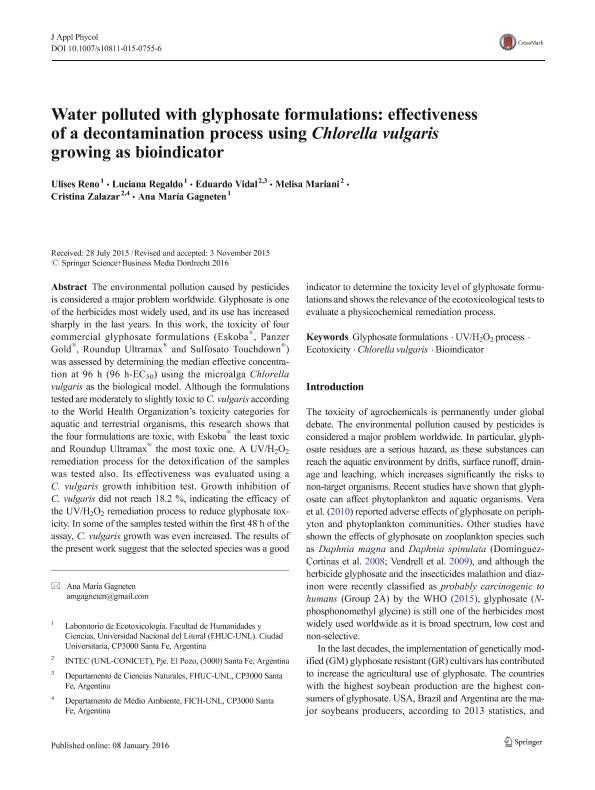Artículo
Water polluted with glyphosate formulations: effectiveness of a decontamination process using Chlorella vulgaris growing as bioindicator
Reno, Ulises ; Regaldo, Luciana María
; Regaldo, Luciana María ; Vidal, Eduardo Gabriel
; Vidal, Eduardo Gabriel ; Mariani, Melisa Lourdes
; Mariani, Melisa Lourdes ; Zalazar, Cristina Susana
; Zalazar, Cristina Susana ; Gagneten, Ana María
; Gagneten, Ana María
 ; Regaldo, Luciana María
; Regaldo, Luciana María ; Vidal, Eduardo Gabriel
; Vidal, Eduardo Gabriel ; Mariani, Melisa Lourdes
; Mariani, Melisa Lourdes ; Zalazar, Cristina Susana
; Zalazar, Cristina Susana ; Gagneten, Ana María
; Gagneten, Ana María
Fecha de publicación:
01/2016
Editorial:
Springer
Revista:
Journal Of Applied Phycology
ISSN:
0921-8971
Idioma:
Inglés
Tipo de recurso:
Artículo publicado
Clasificación temática:
Resumen
The environmental pollution caused by pesticides is considered a major problemworldwide. Glyphosate is one of the herbicides most widely used, and its use hasincreased sharply in the last years. In this work the toxicity of four commercial glyphosate formulations (Eskoba®, Panzer Gold®, Roundup Ultramax® and Sulfosato Touchdown®) was assessed by determining the median effective concentration at 96 h (96 h-EC50) using the microalgae Chlorella vulgaris as the biological model. Although the formulations tested are moderately to slightly toxic to C. vulgaris according to the World Health Organization´s toxicity categories for aquatic and terrestrial organisms, this research shows that the four formulations are toxic, being Eskoba® the least toxic and Roundup Ultramax® the most toxic one. On the other hand, a UV/H2O2 remediation process for the detoxification of the samples was tested. Its effectiveness was evaluated using a C.vulgaris growth inhibition test. Growth inhibition of C. vulgarisdid not reach 18.2 %, indicating the efficacy of the UV/H2O2 remediation process to reduce glyphosate toxicity. In some of the samples tested within the first 48 h of the assay, C. vulgaris growth was even encouraged. The results of the present work suggest that the selected species was a good indicator to determine glyphosate formulations toxicity level, and shows the relevance of the ecotoxicological tests to evaluate a physicochemical remediation process.
Palabras clave:
Tratamiento
,
Efluentes
,
Oxidacion
,
Toxicidad
Archivos asociados
Licencia
Identificadores
Colecciones
Articulos(CCT - SANTA FE)
Articulos de CTRO.CIENTIFICO TECNOL.CONICET - SANTA FE
Articulos de CTRO.CIENTIFICO TECNOL.CONICET - SANTA FE
Articulos(INTEC)
Articulos de INST.DE DES.TECNOL.PARA LA IND.QUIMICA (I)
Articulos de INST.DE DES.TECNOL.PARA LA IND.QUIMICA (I)
Citación
Reno, Ulises; Regaldo, Luciana María; Vidal, Eduardo Gabriel; Mariani, Melisa Lourdes; Zalazar, Cristina Susana; et al.; Water polluted with glyphosate formulations: effectiveness of a decontamination process using Chlorella vulgaris growing as bioindicator; Springer; Journal Of Applied Phycology; 28; 4; 1-2016; 2279–2286
Compartir
Altmétricas



